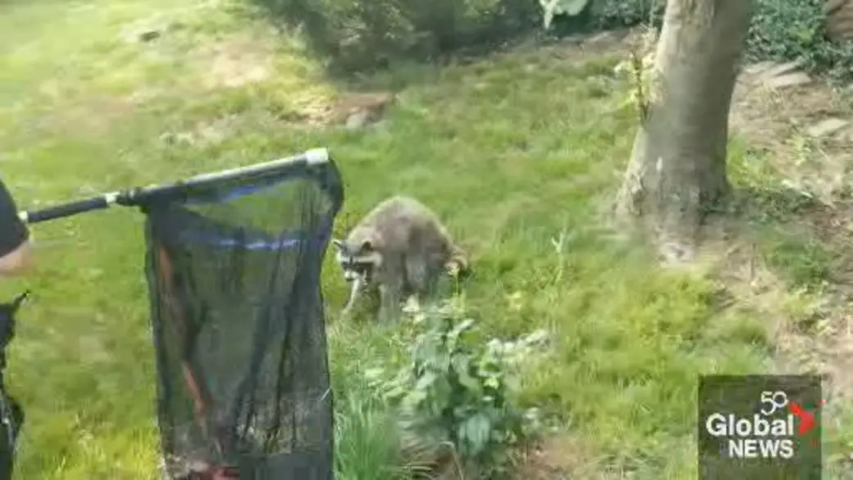
Photo from Global News.
A virus known to cause raccoons to exhibit strange behavior, akin to that of zombies, has been spreading for years across various regions of Canada. Canine distemper virus (CDV) is the culprit, and encountering an infected raccoon can be unsettling.
According to Bill Dowd, founder and CEO of Skedaddle Wildlife, raccoons infected with CDV may behave unusually. They may lose their fear of humans and exhibit zombie-like movements, such as standing on their hind legs, baring their teeth, and emitting growling sounds. These raccoons may even appear disoriented, staggering around as if intoxicated.
Dowd advises against approaching an infected raccoon or attempting to relocate it, as such actions could inadvertently spread the virus to other animals. Instead, he recommends contacting local authorities, such as the humane society, for assistance.
Nathalie Karvonen, executive director of the Toronto Wildlife Centre animal hospital, explains that distemper virus has been rampant in Toronto for the past 15 to 20 years. Initially transmitted by pets, the virus has since become a significant concern for raccoons.
While pets are typically vaccinated against CDV, there is no vaccination campaign for raccoons due to the virus's inability to infect humans. Karvonen expresses sadness for the raccoons affected by the virus, highlighting the lack of available preventative measures for these animals.
In April, Toronto Animal Services (TAS) reported a sharp increase in service calls related to sick and injured raccoons, signaling a worsening situation. Warmer weather and increased animal activity contribute to the virus's spread, as raccoons interact more frequently and closely.
Symptoms of CDV may resemble those of rabies, which has been a concern in Quebec recently. Responding to rabies cases near the Quebec border, Quebec initiated a vaccination campaign in late April, distributing vaccine baits to prevent the disease's spread among raccoons.
Meanwhile, Ontario has managed to control rabies cases among raccoons, with reported instances decreasing by 90% since 2016. The province conducts annual raccoon vaccination campaigns to prevent rabies outbreaks.
In the event of a raccoon scratch, Dowd advises seeking immediate medical attention, as a rabies shot may be necessary. While raccoon attacks on humans are rare, experts caution against attempting to domesticate these wild animals. Raccoons raised by humans lose their fear of humans and may become aggressive, posing a risk to both people and property.
In summary, the spread of canine distemper virus among raccoons in Canada poses significant challenges for wildlife conservation and public health. Efforts to manage the virus include heightened awareness, vaccination campaigns, and responsible interaction with wildlife.















